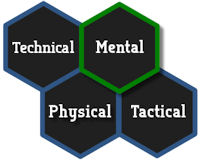Tune up your tennis
Do you feel like you would like to improve your tennis or that you have plateaued? Do you have a desire to hit the ball better or to move more efficiently? Are you new to tennis or do you feel you would benefit from lessons with a patient, friendly and highly qualified tennis coach? Then our bespoke individual tennis coaching is for you.
Is your game being hampered by your mind getting in the way? Do you wish that you could concentrate when you need to and not allow nerves to ruin your game? Winning Essence can also assist you with our range of tennis workshops.Boxing Workshops
Boxing is one of the toughest sports there is. Not only does it test your physical and technical abilities to the limit, it also has a massive mental part that, if not addressed, can leave you vulnerable to frustration. Don't let your mind sabotage the hard work you put into all your training and come along to Winning Essence's specially designed boxing workshops in conjunction with the elite Rathbone Boxing Club in Soho, London.
Music Performance Anxiety Webinar
Listen again to Dr Ally Daubney and myself as we explore the causes of, and numerous strategies to handle, music performance anxiety in this free webinar. Hosted by the ISM Trust, this webinar provides practical help for music teachers seeking to assist their students handling the psychological demands of performing. Musicians themselves can also benefit from this webinar's recommendations.
INTRODUCING WINNING ESSENCE
 Winning Essence is here to provide you with everything you need to develop your potential whatever your performance domain. From Music and the Arts, sport and health through to the psychological difficulties of Diabetes management. Take a look at our skill development diagram to the side here. Consider the importance you place on each of the four central areas of skill development. Then, think about how you have been training to date. If you feel you are not achieving your potential then it is likely that one aspect of your skill development is unattended to. Far too often this is the mental or psychological side of your performance. If you feel that you are not showing yourself in the best light, if you are struggling with your mental health (e.g. Depression, Anxiety, OCD, Perfectionism amongst many others) or if you are simply not enjoying yourself as much as you would like, the answer may lie in speaking to our professionally qualified Chartered Psychologist.
Winning Essence is here to provide you with everything you need to develop your potential whatever your performance domain. From Music and the Arts, sport and health through to the psychological difficulties of Diabetes management. Take a look at our skill development diagram to the side here. Consider the importance you place on each of the four central areas of skill development. Then, think about how you have been training to date. If you feel you are not achieving your potential then it is likely that one aspect of your skill development is unattended to. Far too often this is the mental or psychological side of your performance. If you feel that you are not showing yourself in the best light, if you are struggling with your mental health (e.g. Depression, Anxiety, OCD, Perfectionism amongst many others) or if you are simply not enjoying yourself as much as you would like, the answer may lie in speaking to our professionally qualified Chartered Psychologist.
Here at Winning Essence we provide tailored mental health provision to you based on leading scientific research. Our goal is to help you acquire the necessary skills and understanding of healthy psychological functioning to enable you to enjoy your life and achieve your goals - in whatever domain of life that is. As evidence of this, just look at what our customers have been saying about us.
So whatever your work, health or performance domain and whatever your goal, Winning Essence can assist you to "become who you want to be."





